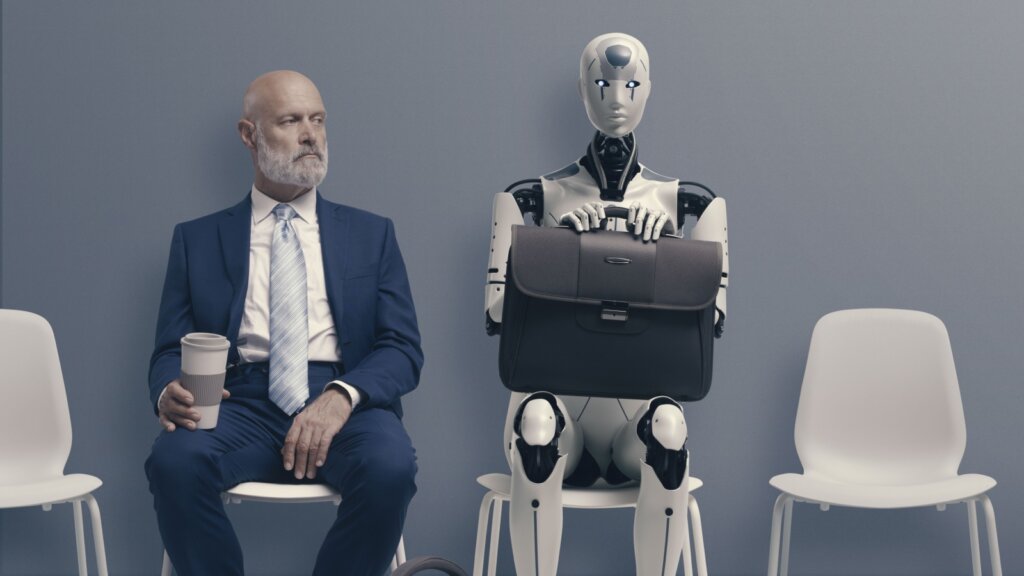Artificial intelligence (AI) integration continues to reshape various industries, impacting the nature of work and employment. Over the next three years, several jobs are poised to be replaced or significantly transformed by AI-driven automation. Knowing which industries and roles are likely to be replaced can give us a head start in ensuring that we are prepared for a different role or have diversified skills to easily transition to a new role.
Here are 10 Jobs AI Will Replace in the Next 3 Years
Retail Cashiers
Traditional retail cashier roles are rapidly being replaced by self-checkout systems and cashier-less stores. These automated solutions streamline the checkout process, reducing the need for human intervention. Customers can scan and pay for their items without the assistance of a cashier, while AI-powered systems handle transaction processing and inventory management in the background. As these technologies become more widespread, the demand for human cashiers will decline significantly in the next three years.
Telemarketers
AI-driven chatbots and voice recognition technology are revolutionizing customer service and sales, particularly in telemarketing. Automated systems can interact with customers, answer inquiries, and even process orders without human intervention. This eliminates the need for traditional telemarketers to make cold calls and pitch products or services over the phone. As companies increasingly adopt AI-powered solutions to handle customer interactions, human telemarketers’ role will likely diminish in the coming years.
Data Entry Clerks
Data entry tasks such as inputting information into spreadsheets or databases are ripe for automation with AI technology. AI algorithms can analyze data sources, extract relevant information, and input it into digital systems quickly and accurately. This reduces the reliance on human data entry clerks who manually perform these repetitive tasks. The need for human intervention in data entry roles is expected to decrease in the coming years.
Fast Food Workers
The fast-food industry embraces AI-driven automation to streamline operations and enhance efficiency. From self-service kiosks to automated cooking robots, technology is reshaping the way orders are processed and prepared. Customers can place their orders digitally, reducing the need for human interaction at the counter. Additionally, automated cooking systems can handle food preparation tasks with precision and consistency. As fast-food chains increasingly adopt these technologies, we will likely see fewer human workers service us. Chipotle, White Castle, and Sweetgreen have already started using them in kitchens.
Bank Tellers
The rise of online banking and mobile apps has reduced the demand for in-person banking services, impacting the role of traditional bank tellers. AI-powered chatbots and automated teller machines (ATMs) can handle routine banking transactions, such as deposits, withdrawals, and account inquiries. This diminishes the need for human tellers to perform these tasks manually. Human tellers will likely be one of the first banking roles to be eliminated.
Assembly Line Workers
Manufacturing industries increasingly use AI and robotics to automate assembly line processes. Automated systems can perform repetitive tasks with speed, precision, and consistency, reducing the need for human intervention. Robots equipped with AI algorithms can assemble products, inspect for defects, and package items for shipping. This automation improves production efficiency and reduces labor costs for manufacturers. Automaker Mercedes has already started using them in their factories.
Drivers
The development of autonomous vehicles is causing a massive upheaval in the transportation sector. Self-driving technology has the potential to replace human drivers in various roles, including taxi drivers, truck drivers, and delivery drivers. Autonomous vehicles can navigate roads, adhere to traffic laws, and transport goods or passengers without human intervention. As these technologies mature and gain regulatory approval, the need for human drivers is expected to diminish, at least in wealthier countries. Nvidia and Tesla are powering technology in this space.
Receptionists
AI-driven virtual assistants and chatbots are increasingly used to automate receptionist duties in businesses and organizations. These automated systems can handle incoming calls, schedule appointments, and provide information to visitors without human intervention. Virtual receptionists are available 24/7 and can efficiently manage multiple tasks simultaneously. As companies embrace AI-powered solutions to enhance customer service and streamline operations, the role of the human receptionist will pass away into obscurity. The intelligent virtual assistant market is expected to grow to $45.83 billion by 2028.
Customer Service Representatives
These automated systems address inquiries, resolve issues, and disseminate information without requiring human intervention. With their availability round-the-clock, chatbots significantly enhance responsiveness and accessibility for customers. As businesses embrace AI-powered customer service solutions to streamline operations and enhance service quality, the prominence of the human element in customer interactions diminishes considerably. This shift towards automation offers numerous benefits, including cost reduction and improved efficiency, albeit potentially at the expense of human-centric interactions.
Warehouse Workers
AI-powered robots are reshaping warehouse operations by automating tasks such as inventory management, picking, packing, and shipping. These robotic systems can operate 24/7 with speed and precision, improving efficiency and reducing labor costs for warehouse operators. Autonomous robots can navigate warehouse environments, locate items, and transport goods without human intervention. As AI-driven robotics technology advances, the demand for human warehouse workers will likely decline in the next three years, leading to job displacement in the logistics industry. In 2023, Amazon started experimenting with robots in warehouses.
Conclusion
AI-driven automation presents several advantages, such as heightened efficiency and reduced costs. As technological progressions reshape the labor market, individuals and organizations must acclimate to the evolving work environment of the AI era. This adaptation entails fostering a culture of continuous learning and embracing opportunities for skill development. By prioritizing reskilling and upskilling efforts, individuals can equip themselves with the competencies to thrive in an AI-driven economy.

Harvi Sadhra is the CEO of Revir Media. He has over 10 years of experience in digital media and has been featured in many of the largest media brands on topics related to finance, stocks, money, technology, and more.
